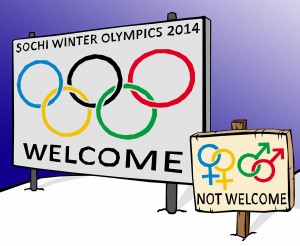
By passing a law prohibiting propaganda of non-traditional sexual relations, Russia has opened the floodgates to harassment and violence toward the gay and lesbian community, which casts an undeniable shadow over the upcoming Winter Olympics in Sochi, Russia.
Under the new law, propaganda is defined as the spreading of information to form non-traditional sexual desires in children, describing such relations as attractive, promoting the distorted understanding of social equality of traditional and non-traditional relations. That pretty much covers any pro-gay activity from anyone.
The law has sparked a massive, national anti-gay movement organized by two groups, Occupy Pedophilia and Occupy Gerontophilia, both of whom claim to be attempting to reform gays, according to the Russian LGBT Network. Reports show pockets of violence toward gay and lesbians in cities throughout Russia and harassment through social media as anti-gay activists use the law to justify their actions against them.
To do this shortly before the Winter Olympics in 2014 sends a clear message — Russia opposes the more liberal pro-gay legislation around the world and in the U.S. The head of the Russian Orthodox Church Patriarch Kirill was quoted in a recent sermon as saying “legislation of single-sex marriages is bringing the apocalypse closer.”
The U.S. State Department issued a travel warning for citizens planning to travel to Russia, saying discrimination on the basis of sexual orientation is widespread.
The Olympics are supposed to be a safe, fun environment for nations to display their best athletes and allow them to compete on the world’s biggest stage. It seems Russia has decided to use it to bolster support for President Vladimir Putin’s conservative agenda.
Human Rights Watch, in a recent statement to the International Olympic Committee, asked them to send a signal to Russia stating the legislation is at odds with Russia’s human rights and Olympic commitments. All competing nations should send this same message to Russia by calling in concerns to the committee themselves.
Another human rights organization, Human Rights Campaign, sent a letter to NBC Universal asking the network to highlight the anti-gay laws in Russia during coverage of the games. This could call Putin’s bluff. The legislation states any media outlet promoting non-traditional sexual orientation or unwanted solicitation that could provoke interest to such relations can be fined up to 1 million rubles or about $300,000.
Shortly after the law passed, four Dutch nationals were detained in the northern Russia region of Murmansk, according to the Russian LGBT Network. The group was attending a human rights festival there and was forced to stay in Russia until they attended a court hearing and paid fines. What constitutes the spreading of propaganda under this legislation is extremely open-ended and should raise major concern among tourists wanting to attend the games.
If two men or two women hug in celebration of a victory for their nation, are they then promoting nontraditional sexual orientation and subject to a court date in Russia and fines? Fans of the games should not have to worry that something as innocent as a hug could land them in a cold Russian jail cell.
The answer to this is not easy. It would be too much for the U.S. to ask its athletes to boycott the games and not compete. That happened in 1980, and it left no one pleased.
However, the opening ceremony is watched by hundreds of millions worldwide, and it would send a clear message back to Russia if several nations banded together, athletes and spectators alike, and protested the opening ceremony instead of attending or watching on television.
The message would be that discrimination of any kind is no longer tolerable in today’s global society, especially after being honored with an invitation to host something as sacred to the world as the Winter Olympics.


























